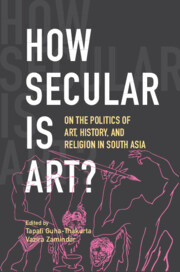10 - A Historian among the Goddesses of Modern India
Published online by Cambridge University Press: 21 February 2023
Summary
We make the gods, and the gods make us.
I am no longer beset by the need to occlude the traces of the irreducibly autobiographical in cultural speculations of this sort.
The ‘fragile social achievement’ that is modern secular life has needed many symbolic fictions—some enduring, others more ephemeral—to sustain itself over time and across numerous (rivalling) constituencies. Among the most intriguing of these fictions in modern India, with its own specific history of secularity, is the mother/goddess, a more-than-human figure with roots in a hoary ancient past but with a palpable consequential presence in the present, a being whose simultaneous claim to transcendent divinity and earthly maternality undercuts any easy separation as sacral or secular, divine or worldly. In this essay, I offer some reflections on what I have learned as a professional historian over the past two decades and more as a series of these intriguing more-than-humans succeeded in capturing my imagination, in disturbing the terms of my engagement with official documentary archives, in troubling the text-saturated categories of my analysis, and in redirecting my work along paths that I had not envisioned before my unanticipated encounter with them, compelling me to become, in the process, goddess-aware. This awareness, I would insist, does not imply ‘a nostalgia for religious forms that would oppress selves and impede reason’, but rather a willingness ‘to enter into productive assemblages with them’, and an inclination towards cultivating ‘a porous self’.
You have to take my word: I did not seek out these multi-armed miracle-working beings of my own accord; instead, they erupted over and again in the most unexpected ways and places, demanding my scholarly attention and refusing to go away. Unlike scholars of religion who work on the South Asian subcontinent, especially feminist scholars of Hinduism, for whom the goddess is indeed a staple, the respectable card-carrying historian of modern India typically maintains a discreet distance from these sites of affective intensity. We keep them at bay on the margins of our disciplinary practice, occasionally invoking them in passing sometimes, but then moving on, all too quickly, seemingly embarrassed about incorporating them more centrally into our ‘objectivist’ narrative(s).
- Type
- Chapter
- Information
- How Secular Is Art?On the Politics of Art, History and Religion in South Asia, pp. 297 - 330Publisher: Cambridge University PressPrint publication year: 2024



